Israel-Hamas War: What happened on Day 109?
Egypt-Israel ties at risk over Philadelphi Corridor • Three fallen IDF soldiers named on Monday • IDF launches western Khan Yunis push
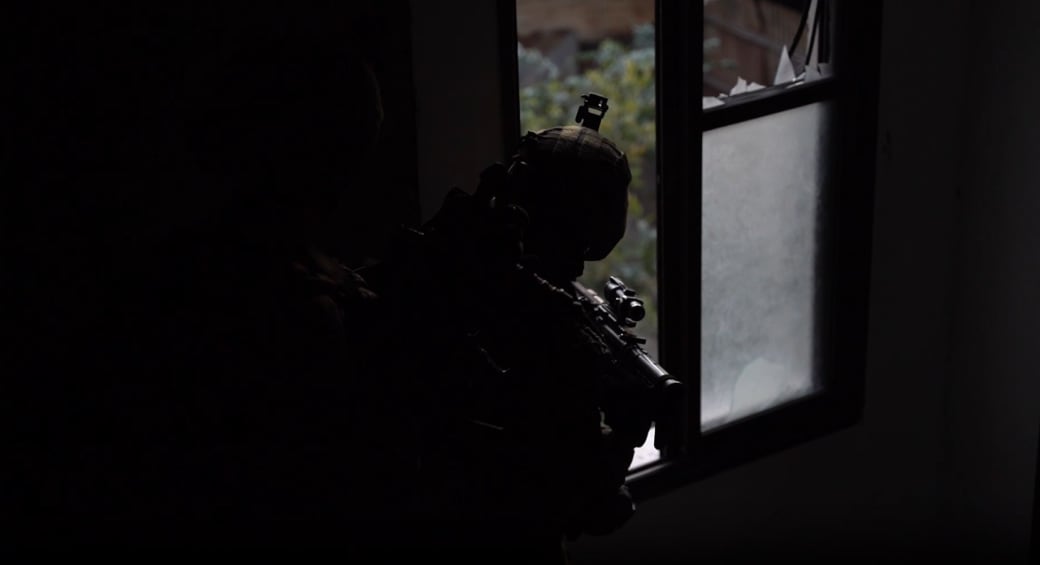

Hamas causes buildings to collapse - 21 IDF soldiers dead, several injured
This news comes after three soldiers were killed in battle the day before.
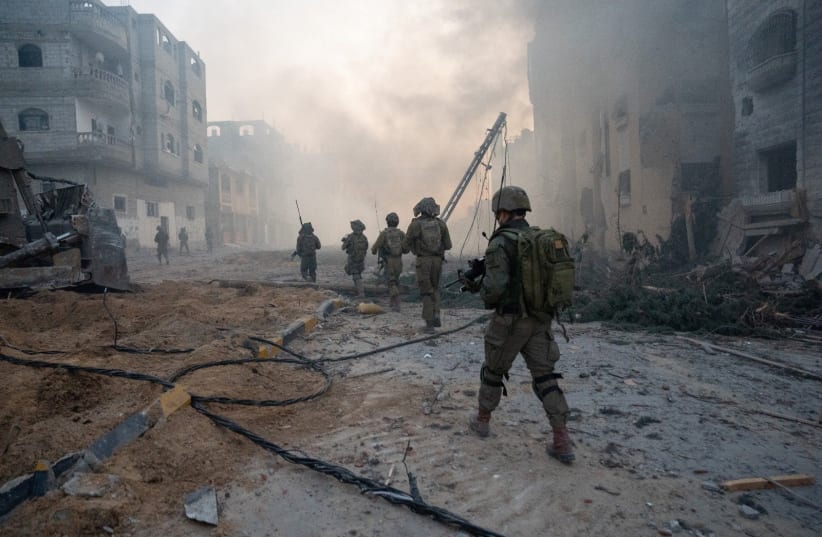
The IDF announced the death of 21 reservists fighting in the Gaza Strip on Tuesday.
Hamas forces fired a rocket-propelled grenade on multiple adjacent structures, along with landmines that the IDF forces had collected and brought into the buildings, which caused a total collapse that killed 19 soldiers and injured several others on Monday.
The incident occurred around 4:00 p.m. in al-Muasi in central Gaza.
In addition, a separate rocket-propelled grenade was fired on an IDF tank which killed two IDF soldiers and injured two others.
Details of the massive explosion are being investigated
It was unclear if the soldiers had violated procedures by bringing the landmines into the structures with them and also unclear how much the collapse of the building was caused by the RPG versus the secondary landmines explosions.
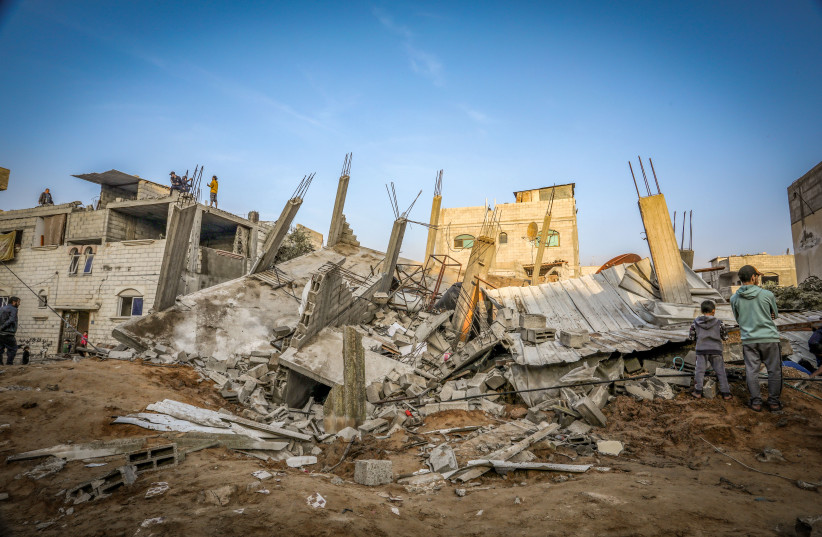
The IDF forces who were harmed were mostly reservists assigned to clear certain areas of dangerous items, such as mines.
Rescue activities went on for hours with the brigade commander having been on site from the start of the incident.
It was unclear what happened to the Hamas attackers.
Names of the soldiers killed
The IDF released the names of 10 soldiers of the 21 that were killed.
Maj.-Gen. (res.) Matan Lazar, 32, from Haifa, a soldier from the IDF's 6261 Battalion, 261's Brigade.
Maj.-Gen. (res.) Hadar Kapeluk, 23, from Moshav Mevo Beitar, and was a Class Commander in the IDF's 8208 Battalion, 261st Brigade.
Sgt.-Maj. (res.) Sergey Gontmaher, 37, from Ramat Gan, who was a soldier in the IDF's 8208 Battalion, 261st Brigade.
Maj. (res.) Elkana Yehuda Sfez, 25, from Kiryat Arba, was a soldier in the 8208 Battalion, 261st Brigade.
St.-Sgt. (res.) Yoval Lopez, 27, from the settlement Alon Shvut in the West Bank, a soldier in the 9206 Battalion, 205th Brigade.
Maj. (res.) Yoav Levi, 29, from the city Yehud-Monoson in central Israel, who was a soldier in Battalion 8208, 261st Brigade.
Maj. (res.) Nicholas Berger, 22, from Jerusalem, who was a soldier in the 8208 Battalion, 261st Brigade.
Maj. (res.) Cydrick Garin, 23, from Tel Aviv-Yafo, who was a soldier in the 8208 Battalion, 261st Brigade.
St.-Sgt. (res.) Rafael Elias Mosheyoff, 33, from the town Pardes Hanna-Karkur near Haifa, was a soldier in the 6261 Battalion, 261st Brigade.
St.-Sgt. (res.) Barak Haim Ben Valid, 33, from Rishon Lezion, class commander in Battalion 6261, Brigade 261.
Names of additional dead soldiers are expected to be announced once the IDF has been able to fully verify their identities and contact their relevant families.
Israeli officials' comments
Israeli President Isaac Herzog wrote that "behind every name whose world has fallen apart - a family that we take to our hearts with sorrow and pain, and at the same time with pride - for the heroism of the generation."
Defense Minister Gallant stated, "On this difficult and painful morning, the enemy's message reaches many homes in Israel; our hearts are with the dear families in their most difficult time. This is a war that will determine the future of Israel for decades to come - the fall of the fighters is a requirement to achieve the goals of the war.
"I send my condolences from the bottom of my heart to the families of the victims of the campaign and best wishes for a speedy recovery to the wounded."
Finance Minister Bezalel Smotrich described the incident as "heartbreaking news. Condolences from the bottom of my heart to the families of the heroes, the entire nation of Israel embraces you with a broken and aching heart. Our commitment is to ensure that the fall of our soldiers will not be in vain."
Knesset Speaker Amir Ohana said, "It's a difficult morning for the people of Israel to wake up to this heartbreaking news. On behalf of the Knesset, I would like to send my heartfelt condolences to the families of the fallen. Each of them is a world full of families, hopes, and dreams that were cut short prematurely. We all wish and pray for a speedy recovery of the wounded."
Yesh Atid Leader Yair Lapid said that he "sends a hug to the families of the soldiers. The entire nation of Israel is with you in your difficult time. May their memory be a blessing."
Agriculture Minister and security cabinet member Avi Dichter said, "Most of the soldiers were reservists, who left entire families without a father and an entire country shocked and in pain."
Go to the full article >>Rabbi Elkana Vizel among 21 fallen soldiers in Gaza
Tragically, Vizel’s life has now ended, but his light will continue to shine on all those who knew and loved him.
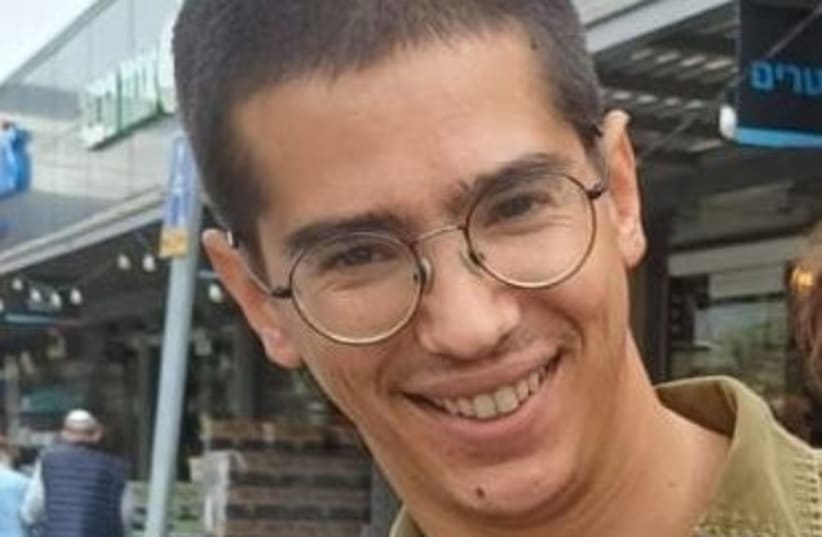
Rabbi Elkana Vizel was among 21 reservists whose deaths were announced by the IDF on Tuesday.
Vizel fell in one of the fiercest battles since the war started. The incident occurred around 4:00 p.m. in al-Muasi in central Gaza when Hamas forces fired a rocket-propelled grenade on multiple adjacent structures, along with landmines that the IDF forces had collected and brought into the buildings, which caused a total collapse that killed 19 soldiers and injured several others on Monday.
Itamar Vizel, Elkana’s twin brother (and the other half of their circus double act) wrote this heartfelt tribute to his twin on his Facebook page: “My heart refuses to believe the words I am writing. [My] twin brother - is no more. He fell heroically… in a battle in the Gaza Strip.”
He finishes with words of the song, “Shemesh” by Hanan Ben Ari: “Then you will be like the sun forever, you will be like a bird wandering in space, you, you will be my king forever, I thank you for the path you promised me."
Heartbroken friends also paid tribute to Vizel, one writing,
“I can't breathe; it is impossible to understand; the heart kicks out this hard news. Itamar - we won't forget Elkana until our last day, What a sweet man, What a heart, What a light! Unbelievable. Simply inconceivable”
Vizel, who was previously called up to fight in Gaza as a reservist in Operation Protective Edge in 2014, where he was injured in battle, spoke of his experience in a YouTube video recorded two years ago. In it, he says he made sure he had his tefillin with him before he was evacuated to safety. He also says how thankful he was to God for saving him and giving him a new lease of life.
Tragically, Vizel’s life has now ended, but his light will continue to shine on all those who knew and loved him.
Go to the full article >>IDF's latest push in western Khan Yunis remains intense
Dozens more Hamas terrorists had been killed by Tuesday morning.
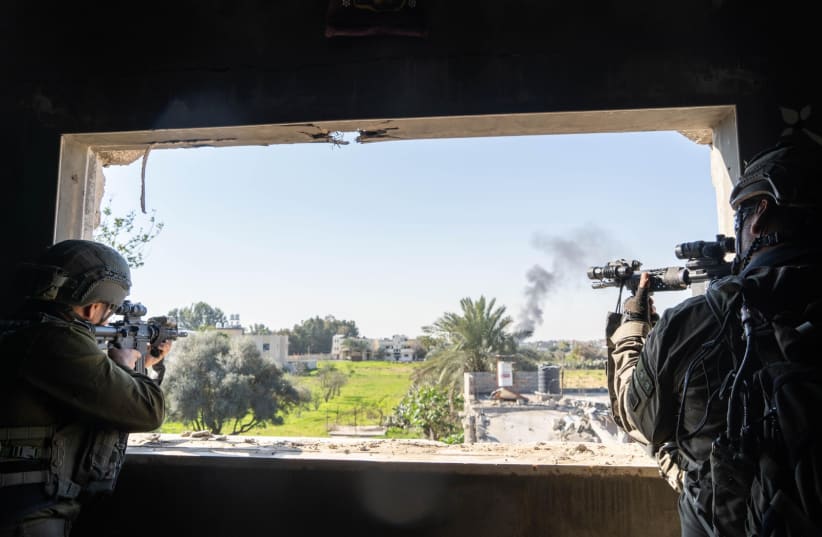
The IDF on Tuesday continued its major division-level new push in western Khan Yunis, which it had started on Monday, maintaining the most intense fighting since early December when the military first entered other parts of Hamas’s southern capital.
Combined between Monday and Tuesday, close to 100 Hamas terrorists have already been killed in larger-than-usual organized battles, with 50 Hamas fighters killed on Monday and dozens more on Tuesday.
There were no signs that the incident in central Gaza in which 21 IDF soldiers were killed was having any direct impact on the ongoing Khan Yunis attack.
On Monday, Division 98 unleashed serious forces from its seven brigades, artillery, tanks, and air support and surrounded western Khan Yunis, which until now, the IDF had mostly steered clear of.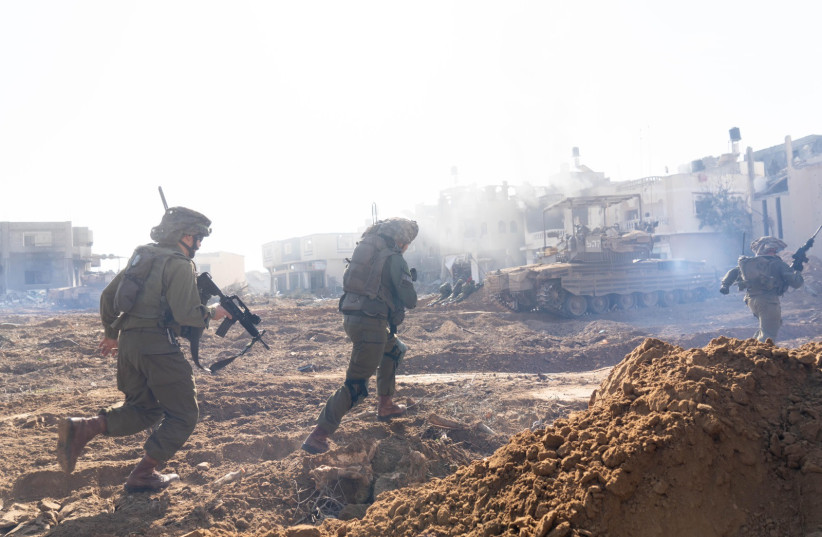
On Tuesday, the IDF said it had killed a number of ambush units with rocket-propelled grenade launchers and anti-tank missiles, as well as a number of Hamas forces in extremely close-range fighting.
The IDF’s message early Monday morning about large amounts of airstrikes was in preparation to give the ground forces an easier time moving into the new areas.
For the last seven weeks, IDF attacks on Khan Yunis had focused on the northern and eastern portions of the city.
On both days, the IDF called western Khan Yunis the heart of Hamas’s operations there, including areas where its top two leaders, Yahya Sinwar and Muhammad Deif, grew up.
Further, the IDF said that it recognizes that this part of Khan Yunis is the most dense area in the city in terms of having less room to maneuver and a larger number of civilians and sensitive sites, including hospitals.
It said that it had learned many lessons from dealing with some parallel issues in northern Gaza, while also noting some critical differences unique to southern Gaza.
The IDF hopes this new push will break the ability of the Khan Yunis Brigade to continue to fight as an organized force.
There are still no immediate plans though to enter Rafah or take control of the Philadelphi Corridor.
Also, the IDF did not say anything specific about a lead toward Hamas’s leadership or the hostages, though the operation seemed, at the very least, designed to increase pressure on the terror group.
Go to the full article >>IDF Sgt.-Maj. Matan Lazar among 21 soldiers who fell in Gaza on Monday
Lazar is survived by his wife, Ilana, a nurse at Klalit Health Services, and his parents, Silvio and Yosepha.
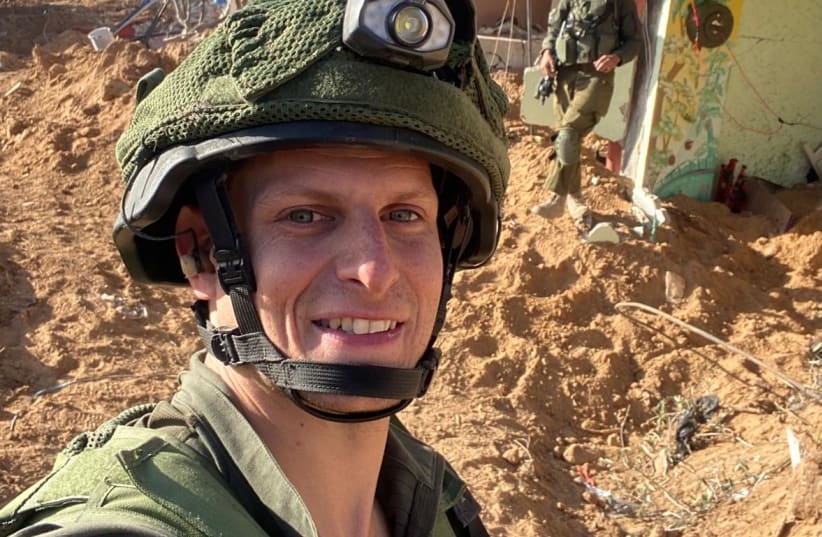
Sergeant Major (res.) Matan Lazar of Haifa, a fighter in the 6261st Battalion of the 261st Brigade, was among the 21 IDF soldiers who fell in battle in the southern Gaza Strip on Monday.
Lazar, 32, a graduate of the Hebrew Reali School in Haifa and the Shamir School of Nursing, was a beloved nurse in the emergency department at the Shamir Medical Center-Assaf Harofeh in Be'er Ya'akov, southeast of Tel Aviv. He had also worked at the Carmel Medical Center.
"We at the Shamir Medical Center (Assaf Harofeh) bow our heads and mourn the death of Sergeant Major Matan Lazar,” the hospital said in a statement. Friends and colleagues described him as dedicated and caring, with a huge heart.
Wherever he worked or studied, Lazar was an active participant in social and professional initiatives, the Health Ministry said in a statement of condolences to the family.
Survived by wife and parents
Lazar is survived by his wife, Ilana, a nurse at Klalit Health Services, and his parents, Silvio and Yosepha.
His funeral will be held today at 1:00 p.m. at the military cemetery in Haifa.
Go to the full article >>Fallen in battle: IDF Sgt. first class (res.) Elkana Yehuda Sfez
Elkana Yehuda is survived by his parents Eliyahu and Rachel and five siblings, Reuven, Shai, Hillel, Shiral, and Tiferet.His funeral will be held today at 4 p.m., at Mount Herzl
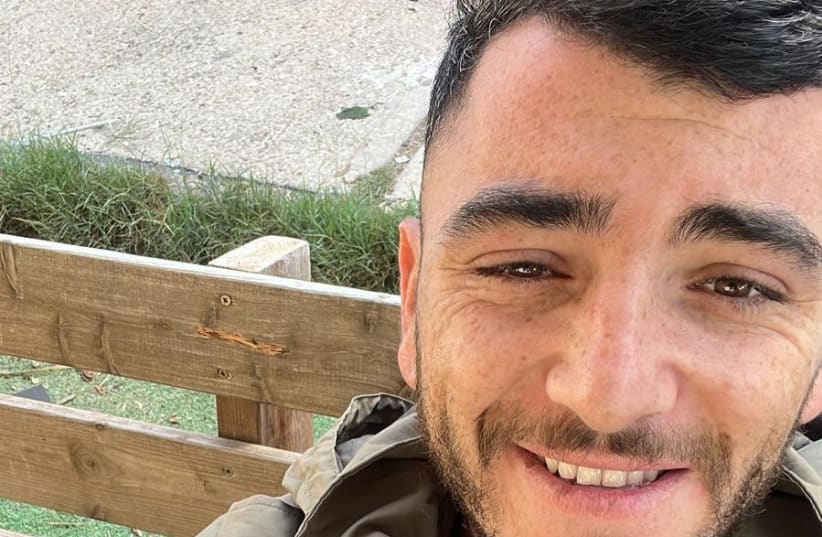
The IDF has named Sgt.-Maj. (res.) Elkana Yehuda Sfez, as one of the soldiers killed on Monday in the incident in the center of the Gaza Strip, in which 21 soldiers died in total.
Elkana Yehuda Sfez, 25 from Kiryat Arba, served as a fighter in the 8208th Battalion of the 261st Brigade. The information was released for publication by the IDF after the family was notified.
Sfez's squad was under fire from RPG missiles and in a building, with explosives, that collapsed according to the IDF press release.
The Kiryat Arba Moetzet shared his IDF death notice on their Facebook group updates from Moetzet Kiryat Arba members calling him a “hero” in a moving tribute.
Elkana Yehuda is survived by his parents Eliyahu and Rachel and five siblings, Reuven, Shai, Hillel, Shiral, and Tiferet.
His funeral will be held today at 4 p.m., at the military cemetery on Mount Herzl.
Herzliya resident arrested for setting fire to display of support for Gaza hostages

A 35-year-old resident of Herzliya was arrested on Tuesday morning on suspicion of setting fire to a display on Dizengoff Street in Tel Aviv that was in support of the hostages currently held in Gaza, Maariv reported.
This is a developing story.
Go to the full article >>Reservist and father of three among Monday's IDF casualties
Lopez was a fighter in the Tank Corps, and served in the 205th Tank Brigade, in the 9206th Battalion. He is survived by his wife, Sigalit, and three young daughters.
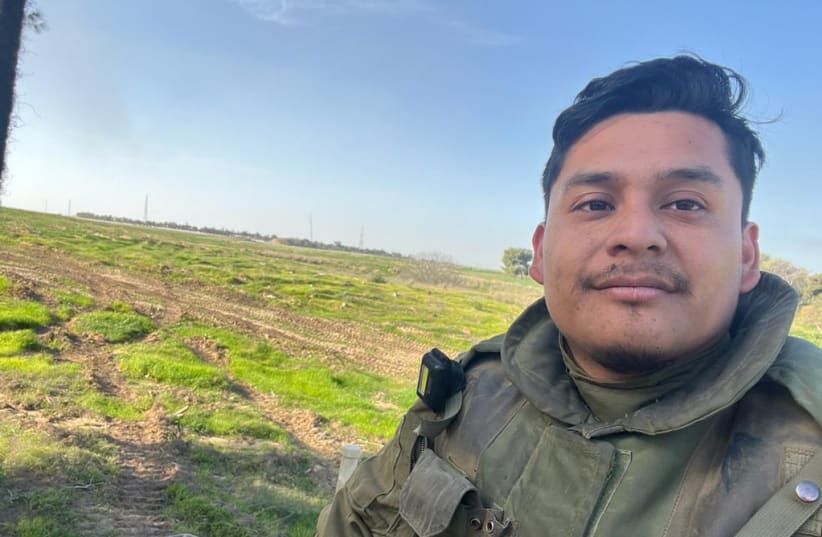
Sergeant First Class (res.) Yoval Lopez, 27, from Kfar Tapuach in the West Bank, was one of the soldiers killed on Monday in the incident in the center of the Gaza Strip, in which 21 soldiers died in total.
Lopez was a fighter in the Tank Corps, and served in the 205th Tank Brigade, in the 9206th Battalion. He is survived by his wife, Sigalit, and three young daughters, aged from eight months to three years old, as well as his parents Yocheved and Yohai Lopez, and two brothers, both of whom are also fighting in the war, one in Jenin and the other in Gaza.
Lopez made Aliyah at age six and grew up in the Bnei Moshe community in the Givat Hahish neighborhood of Alon Shvut, in Gush Etzion, south of Jerusalem. Originally from Trujillo, Peru, the Bnei Moshe are commonly known as the "Inca Jews," most of whom emigrated to Israel in the 1990s. Lopez attended the Orot Yehuda Yeshiva High School in Efrat. His funeral is scheduled for Tuesday afternoon at the Mount Herzl cemetery.
Lopez's missed presence will be felt by many
Naftali Sikacha, first cousin of Lopez's wife Sigalit and also a resident of Kfar Tapuach, mourned, "Yoval and Sigalit, two identical souls, so similar. He was an exemplary father. Dedicated. He served at first on the northern border, but in the middle of the war was transferred to the South, to Gaza. He loved the army. Loved the state."
"He had the soul of a person always willing to give a helping hand," Sikacha continued, adding that Lopez was last home two weeks ago.
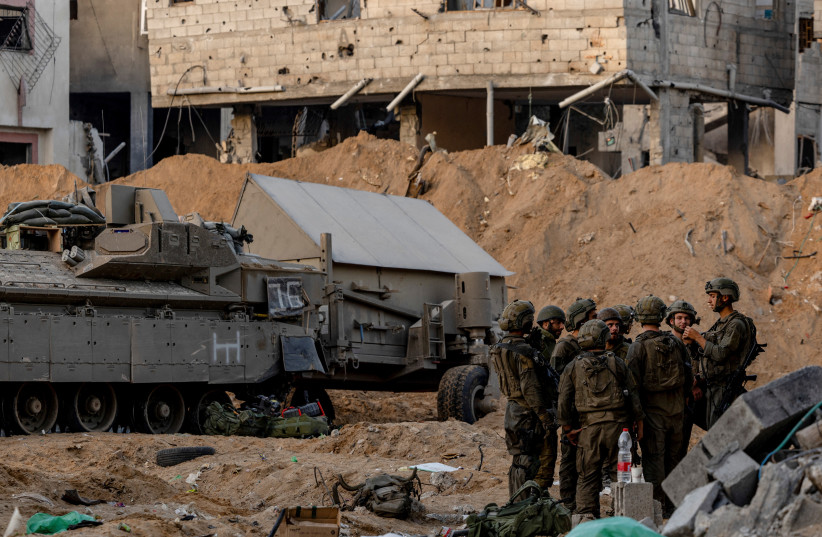
"What can be said? Everything I say about him will be too little. He loved life. My heart is broken," Sikacha said.
Shomron Regional Council head Yossi Dagan said, "Yoval fell while defending the homeland, and left a large hole in all of our hearts. We will continue to stand formidably, the settlement in Samaria and the State of Israel will continue to develop and grow."
Go to the full article >>Outline created for possible Israel-Hamas hostage deal
One of Israel's main requirements in the transaction with Hamas would be to agree to the release of captured terrorists, including those considered under the category of "heavy terrorists."
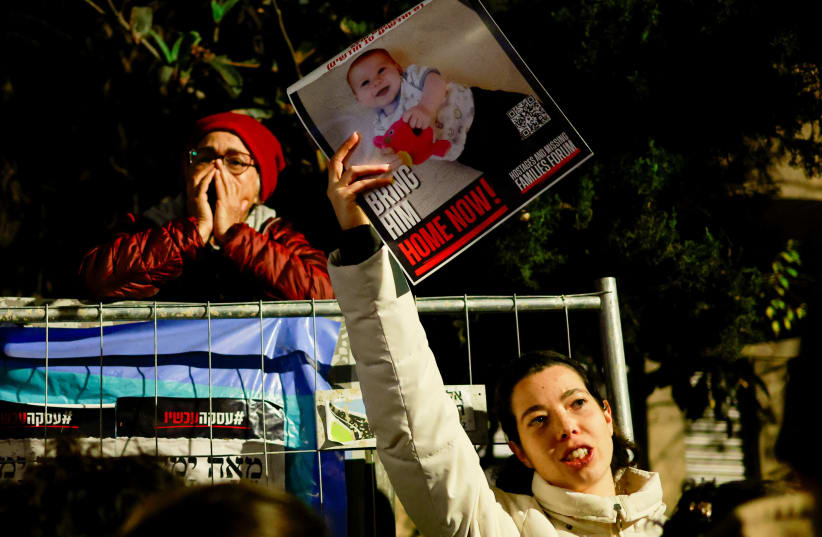
A current plan for an exchange between Israel and Hamas to return Israeli hostages has been outlined, according to Channel 13 reports on Monday.
As talks about the development of another hostage deal during the Israel-Hamas war continue to unfold, this plan has been drawn for negotiation over the course of the past two weeks.
The initial report of the outline is a plan that would take place in three to four stages.
Details of the outlined plan
As a condition to progress in each of these stages, one of Israel's main requirements would be to agree to the release of captured terrorists, including those considered under the category of "heavy terrorists."
The stages of hostage release plan are outlined as follows:
In the first stage, women who remain alive and in captivity and all elderly men would be released. It is currently unclear if their release would occur simultaneously. However, the intention behind the first step is to act as humanely as possible in the removal of the hostages from Hamas captivity.
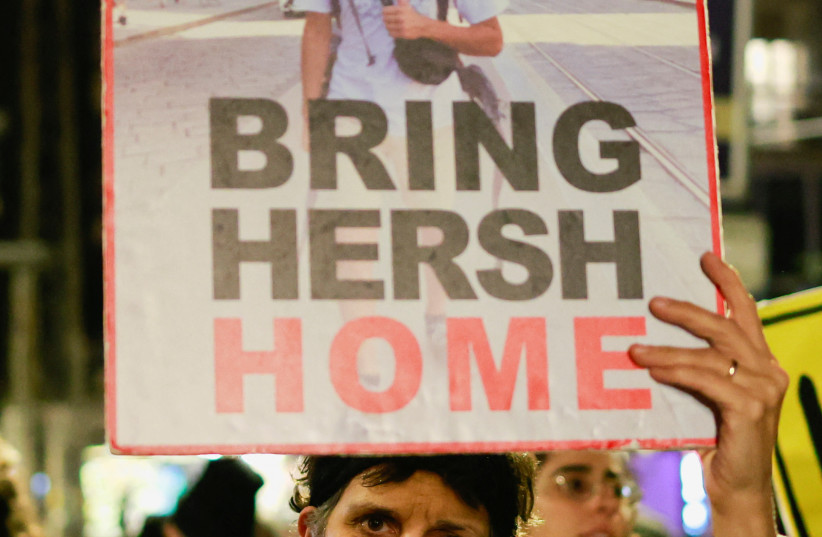
The second stage would be the release of young men. And lastly, the final stage would include the release of soldiers along with the return of bodies being held by Hamas.
This plan is still an outline and is not concrete. No further proposal has come from Hamas in recent days.
According to Prime Minister Benjamin Netanyahu, there is no real proposal from the initiative of Hamas.
"There is an initiative of ours, and I will not go into details," Netanyahu stated in his meeting with representatives of the families of the hostages in his office in Jerusalem.
Go to the full article >>Egypt-Israel ties at risk over Philadelphi Corridor, Cairo says
The head of the State Information Services (SIS) Diaa Rashwan said Israeli accusations that it had failed to secure that border were false.
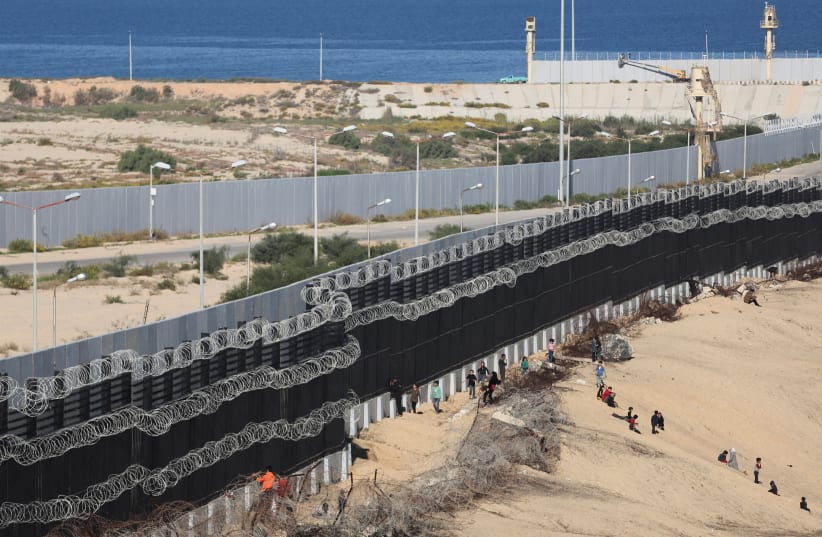
Cairo issued a public warning to Israel on Monday that the ties between the two countries were at risk over IDF control of the Philadelphi Corridor, a narrow 14-kilometer buffer zone that runs along Egypt’s border with Gaza.
“It must be strictly emphasized that any Israeli move in this direction will lead to a serious threat to Egyptian-Israeli relations,” the head of the State Information Services (SIS) Diaa Rashwan said in a statement he issued.
“Egypt,” Rashwan said, “is capable of defending its interests and sovereignty over its land and borders, and will not mortgage it in the hands of a group of extremist Israeli leaders who seek to drag the region into a state of conflict and instability.”
Israel seeks to halt weapons smuggling
This latest message from Cairo warning against IDF control of the Philadelphi Corridor comes as Israel looks to halt a weapons smuggling route from Egypt into Gaza through that buffer zone.
The IDF had controlled that zone under terms set out by its 1979 peace treaty with Egypt until it withdrew from Gaza in 2005.
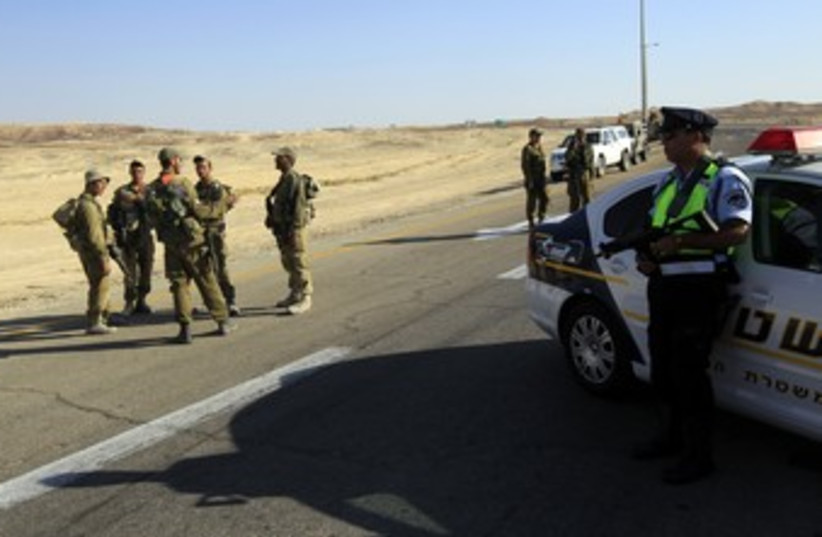
Rashwan said Israeli accusations that it had failed to secure that border were false, explaining that its army had destroyed over 1,500 tunnels in that area and built a 12-foot concrete barrier along that buffer zone, half of which was underground.
“There are three barriers between Sinai and Palestinian Rafah, with which any smuggling operation is impossible, neither above ground nor underground,” Rashwan said.
The Egyptian army in agreement with Israel increased its forces at the border both in 2005 and in 2021 to prevent weapons smuggling, he explained.
“Egypt has full sovereignty over its land, and has complete control over its entire northeastern borders,” he added.
“Israel's continued marketing of these lies is an attempt to create legitimacy for its attempt to occupy the
“Philadelphi Corridor” or “Salah al-Din Corridor”, in Gaza along the border with Egypt, in violation of the security agreements and protocols signed between it and Egypt,” Rashwan stressed.
He also reminded Israel that Cairo also considers any forced displacement of Palestinians from Gaza to Sinai as a “red line” that should not be crossed.
Hamas losses: Up to 60% of terror forces out of action - analysis
The most relevant question is not just whether Hamas fighters are dead, but whether they can continue to fight.
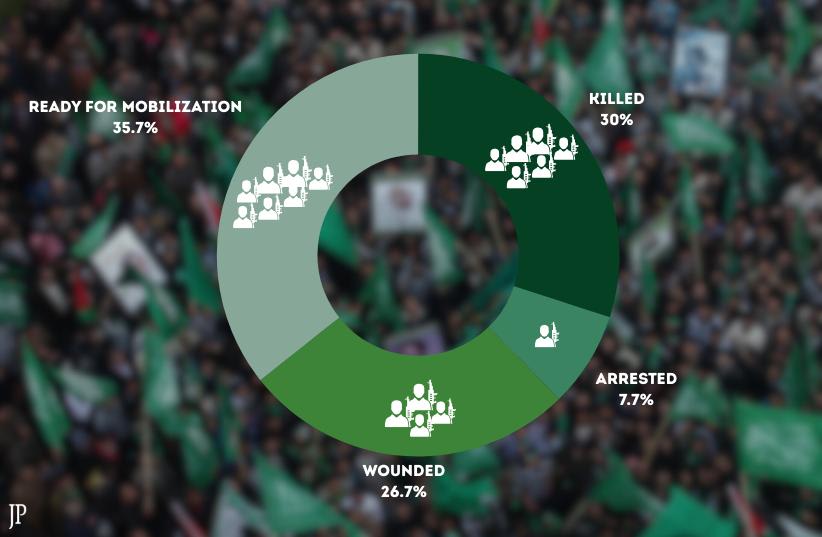
Charting Hamas’s losses over more than 100 days of war with Israel, there are some critical data points:
On the positive side: 48-60% of Hamas’s forces are out of commission – meaning either killed, wounded, or arrested.
On the negative side: the IDF killed around 3,500 in northern Gaza in the initial three weeks of the invasion, but has only killed around 2,000 more in the last six weeks, indicating that elimination of Hamas forces has dropped steeply.
The IDF estimates it has killed 9,000 Hamas terrorists, wounded around 8,000 to a degree that they cannot easily return to battle (a much larger number have been wounded at lower levels), and has arrested 2,300.
This means 19,300 can no longer fight.
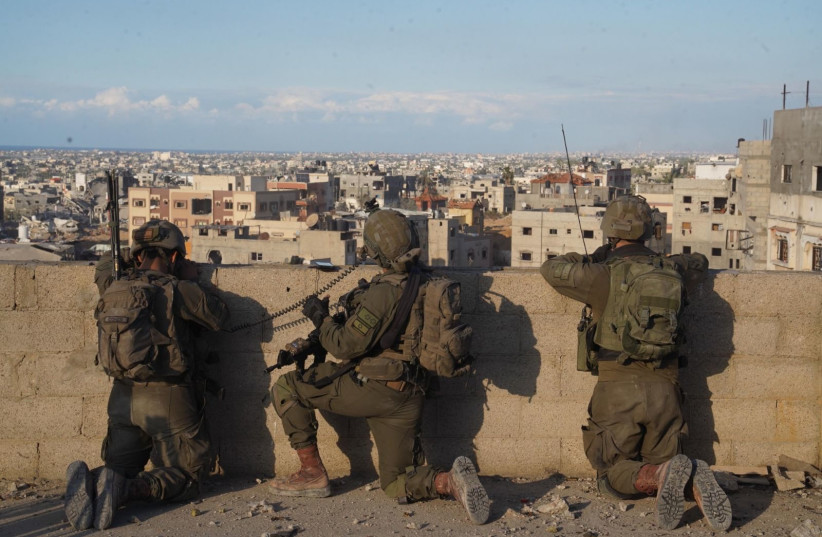
WSJ reported the number of dead, but not the number removed from battle
When The Wall Street Journal published a report citing US officials estimates that the IDF had only killed around 20-30% of Hamas’s forces, the report mentioned, but did not add together all of the elements of removing Hamas forces from the battlefield. So the WSJ figures did not encompass capture the whole picture.
But the most relevant question is how many battle-ready Hamas fighters remain. The problem is that the IDF has provided many different estimates of Hams numbers.
Prior to the war, many reports estimated Hamas forces at 40,000 strong.
Eventually, the IDF went on record with The Jerusalem Post and others at 30,000.
But there were still some IDF officials who went off-script and held to the estimate of 40,000.
The discrepancy could be due to imperfect intelligence or a failure to distinguish combat fighters from Hamas logistics support forces who do not really fight.
Unofficial estimates before the five-day conflict in May 2023 said Islamic Jihad had set its forces, separate from Hamas, at around 10,000.
IDF sources indicated that on the eve of the current war, Islamic Jihad forces had diminished, possibly due to losses during the May 2023 conflict.
Top defense officials seem unsure how to distinguish Hamas and PIJ fighters given that they have cooperated in fighting Israel since October 7.
Rate of killing Hamas fighters has dropped significantly
In the first week of the war the IDF killed 1,500 Hamas terrorists in the battle to expel the organization from Israel’s South. Until October 27, Gaza was bombed, but not invaded, so there was no fixed number of Hamas operatives killed but some top Hamas officials were assassinated from the air.
The IDF’s best weeks were October 27-November 15 when it killed 3,500 Hamas fighters in 20 days, bringing the total dead Hamas forces number up to 5,000.
These included ground battles over Hamas’s military headquarters, its parliament, and areas near its Shifa Hospital command center.
Before Hamas realized how serious the IDF was about a full-scale invasion it believed it was worth fighting above ground in large formations to try to bloody the IDF enough to halt the entire invasion.
However, from November 15-23, the sides entered serious hostage and temporary ceasefire negotiations which stopped the fighting from November 23-30.
The IDF’s next best time period was December 1-10 when it killed around 1,000 Hamas terrorists in a week, mostly during the initial battles in Khan Yunis, southern Gaza, in Shejaia in northern Gaza, and in central Gaza.
By December 10, 7,000 Hamas terrorists had been killed.
Progress started to slow as Hamas retreated underground and it took 14 days, until December 24, for the IDF to kill another 1,000 Hamas forces, to get to 8,000 killed.
Since December 24, the IDF has killed around another 1,000, reaching 9,000.
The question now is whether the IDF is having trouble finding the Hamas forces hiding in the vast tunnel network, whether there are fewer forces than expected, or whether many Hamas fighters have faded into the civilian population and are merely waiting until Israel lets its guard down to pounce again.
Beyond all of these speculations, the larger question is at what point would Hamas break from the losses it has faced?
It appears that due to the Israeli hostages, this question is different from almost any other comparable historical conflict.
Besides removing Hamas forces from the battlefield, the IDF has also killed 19 of 24 battalion commanders.
But not only are three of Hamas’s five brigade commanders still at large, its entire high command is still operational, and with hostages close by to use as human shields.
If Hamas’s top leaders perceive themselves to be invulnerable to Israeli attack behind hostages, and they do not care how many fighters they lose or how much territory the IDF takes over, and if they are not even trying all that hard to pick fights in the current time period, then the main problem is not numbers, but perception.
At some point, the IDF will need to convince Hamas’s top leaders not only that they are destroying their forces, but that time is not on their side and their chances of survival are higher if they negotiate a return of the hostages than if they wait for an Israeli withdrawal.
Go to the full article >>Israel-Hamas War: What you need to know
- Hamas launched a massive attack on October 7, with thousands of terrorists infiltrating from the Gaza border and taking some 240 hostages into Gaza
- Over 1,200 Israelis and foreign nationals were murdered, including over 350 in the Re'im music festival and hundreds of Israeli civilians across Gaza border communities
- 132 hostages remain in Gaza, IDF says